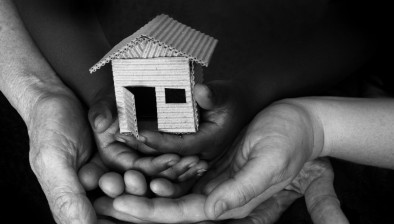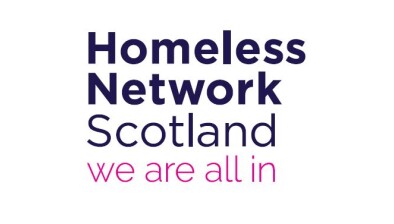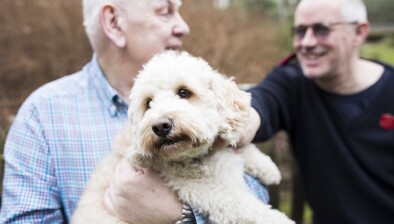Homelessness prevention ‘must be election priority’ as figures point to mixed progress
Helen Murdoch
The Salvation Army has urged all political parties in Scotland to make preventing and ending homelessness a central pledge in their manifestos for next year’s election campaigns after new figures painted a mixed picture of progress and growing pressures on housing and support services.
The latest Homelessness Statistics for Scotland, 2024-25, which were published today, revealed that homelessness applications fell slightly for the first time in four years, with 40,688 households applying, a decrease of 1% on 2023-24. Yet the number of households assessed as homeless or threatened with homelessness rose to 34,067, the highest since 2011-12.
Temporary accommodation reached record levels, with 17,240 households housed on 31 March 2025, up 6% on the previous year. Among them were 10,180 children, an annual rise of 1%. Rough sleeping also worsened, with 2,465 households reporting they had slept on the streets the night before their application, up from 1,932 the previous year.
The statistics show people are spending longer without stable housing. The average stay in temporary accommodation rose to 238 days for those whose cases closed in 2024-25, while open cases are lasting even longer at an average of 305 days.
The Salvation Army says its own data highlights the scale of support needs among people experiencing homelessness. Half of those it helps struggle with mental health issues, while more than 30% arrive without being registered with a GP. Over a quarter (27%) have slept rough before taking up a residential placement.
Helen Murdoch, who leads homelessness services in Scotland for The Salvation Army, pointed to the charity’s Breaking the Cycle report, which found an 87% rise in the number of homeless households with both mental health and substance use support needs over the past decade. She warned that the trend reflects a system under strain.
“The Scottish Government, councils, health providers and charities working together, with proper funding, can prevent homelessness before it starts and save lives this winter,” she said.
“Scotland will never beat homelessness unless we are able to tackle the reasons people become homeless in the first place,” added Helen. “Underlying issues such as poverty, trauma, abuse, addiction and mental health issues all increase the risk. That is why we are calling on all political parties at Holyrood to make homelessness prevention and wrap-around support a priority going into next year’s election.”
The Salvation Army, which helps around 7,000 people each year in Scotland through its Lifehouses and outreach programmes, says the length of time people are stuck in its residential services is also rising sharply. The average stay increased from 297 to 338 days in the past year, which it attributes to a lack of affordable ‘move on’ housing.
Helen Murdoch said: “We all know what needs to be done. The next parliament must prioritise addiction support in the evenings and at weekends; improved mental health services in communities; plus increase the availability of affordable homes to give vulnerable people stability, accessible local healthcare and – above all – hope for the future.”
Commenting on the figures, Callum Chomczuk, national director of CIH Scotland, said: “The latest homelessness statistics show some progress with the number of applications falling very slightly from last year’s all time high. Unfortunately, this hasn’t yet led to a decrease in open cases or the number of households in temporary accommodation but there are early signs that the housing system can recover if the Scottish Government continues to focus resources on housing and homelessness services.
“We welcome the Scottish Government’s Housing Emergency Action Plan which will implement a number of initiatives to tackle homelessness, including £4.9 billion investment in affordable housing over the next four years.
“However, our latest research into affordable housing need commissioned in partnership with Shelter Scotland and SFHA clearly shows that this will not be enough to tackle the housing emergency. Our report shows that we need to deliver 15,693 social and affordable homes every year to meet housing need. This would cost around £8.2 billion over the course of the next parliamentary term.
“As well as delivering new homes, we need consistency in funding for the essential services which help to prevent homelessness from happening or help people who have experienced homelessness to establish and maintain a new tenancy. We urge the Scottish Government to commit to funding Rapid Rehousing Transition Plans beyond the next financial year, providing certainty for local authorities to commission the services needed to end the housing emergency in Scotland for good.”
Gordon MacRae, Shelter Scotland assistant director communications & advocacy, said: “These shocking figures are the devastating reality of Scotland’s persistent housing emergency. We are still seeing the consequences of the failure to deal with the backlog of homelessness and despite the publication of the Cabinet Secretary’s Housing Emergency Action Plan, there is nothing in it that will bring homelessness to an end.
“The minute decrease in homeless applications and children in temporary accommodation are of course a good thing, but they do not disguise the dangers that remain in Scotland’s broken and biased housing system.
“We know that people who present to their council as homeless face the prospect of unlawfully being turned away, of spending the night on the streets, and if they are placed in temporary accommodation, it might be unsuitable or unsafe, and they might be stuck there for years. In that scenario, we need to understand if the drop in applications is because councils are doing better, or if it’s because people are giving up hope of ever getting a home.”
He added: “In the current climate, the failures of the Home Office and the asylum system are making an already difficult situation for councils worse. It’s never been more important that politicians show the public that they can fix the housing system and stop the racists and those that seek to divide us from weaponising the current housing emergency.
“All of Scotland’s politicians know what is needed: deliver a minimum of 15,693 social homes every year so that the local services that can prevent and end homelessness have the tools to do their job.
“If they choose not to do that, we should expect that the next set of homelessness statistics will be worse yet again. Social homes are not an aspiration. They are indispensable.”
Homeless Network Scotland warned that homelessness risks becoming a long-term reality without urgent action.
A spokesperson for the charity said: “Earlier this month, the cabinet secretary for housing Màiri McAllan unveiled measures to heal that system with a housing emergency action plan. While her proposals prioritise creating more social homes and boosting support for people worst affected by the emergency, they don’t go far enough.
“Above all, we need more homes. The £4.9bn spend on affordable homes announced by the cabinet secretary is well short of the estimated £8.2bn cost of creating the required 15,693 homes each year from 2026-2031, set out in a report by Shelter Scotland, the Scottish Federation of Housing Associations and the Chartered Institute of Housing Scotland.
“If we are to bring these numbers down, we also need to make sure everyone has access to the support they need, delivered by a joined-up system with people at the heart.
“More resource for Housing First was welcome. But with an estimated 10% of demand being met today, we need this scaled up dramatically to support people whose homelessness is made worse by severe and multiple disadvantage. This will prevent more people having to sleep rough and ultimately save money for other services including the NHS.
“And looking forward, it is crucial that the new homelessness prevention measures in the Housing Bill are properly resourced and delivered, to divert more people from crisis and ease pressure on services.”
Citizens Advice Scotland (CAS) said the new figures show Scotland’s Housing Emergency is “deepening”.
CAS housing spokesperson Aoife Deery said: “These new figures show without doubt the deepening nature of the national housing emergency with over 17,000 households in temporary accommodation last year, an increase of 6%. Demand for housing advice from our advisers in bureaux across Scotland is also growing, which highlights the value of advice as people face unimaginable uncertainty about their homes.
“Last year, the Scottish CAB network gave housing advice more than 62,000 times, an increase of 7% on the year before, with a particular surge in demand for advice on homelessness. We need the Scottish Government to immediately implement its housing emergency action plan, published earlier this month.
“We can see from the statistics that over 400 people became homeless from the private rented sector due to arrears, 15% higher than the year before. Affordability is no doubt a significant factor in this. The average rent debt that private renters come to the CAB network with is now £4,279, 14% higher than last year: people simply do not have enough money to cover rents. Alongside the emergency action plan, we need to see the implementation of the rent control measures contained in the Housing (Scotland) Bill.
“We also need the UK Government to urgently review Local Housing Allowance and re-align it with real rents. There is a critical opportunity to do this at the Autumn Budget, in line with other social security payments.
“These are the actions we need from governments to ensure that everyone in Scotland has a safe, secure and sustainable home.”
Scottish Government responds
Housing secretary Màiri McAllan said: “These figures demonstrate the scale of the challenge we face in reducing homelessness and ensuring that temporary accommodation, although a vital safety net, is just that - temporary. We must work to prevent homelessness before it occurs, deliver more affordable homes and make better use of the stock we have.
“That is why, earlier this month, I set out a number of direct and immediate measures to tackle the housing emergency - ending children living in unsuitable accommodation, supporting vulnerable communities and creating the optimum conditions for confidence and growth in our housing sector.
“We know that more affordable housing is key to tackling homelessness and, despite the challenges of Brexit, austerity and the cost of living, the Scottish Government has a strong track record in delivering this. My Housing Emergency Action Plan will go further and commits up to £4.9 billion over the next four years to deliver around 36,000 affordable homes as part of a major, affordable housebuilding programme. This will provide family homes for up to 24,000 children.
“We have also doubled our acquisitions funding this year to £80 million, which will allow Councils to act now to acquire family sized homes where they are needed. We are also expanding Housing First which supports those with multiple and complex needs who may be more at risk of rough sleeping and subject to Parliamentary approval will pass groundbreaking new anti-homelessness laws in the form of ‘ask and act’ duties on public bodies. These are part of a suite of actions announced earlier this month which I am pleased have been broadly welcomed by charities, social landlords and housebuilders alike.
“I recognise the significant pressure on homelessness services, particularly in Glasgow, and I continue to meet with the city council to discuss the situation there. Ultimately, the UK cost of living crisis and the UK Government’s mismanagement of the asylum system are creating serious pressures for local authorities, especially Glasgow. We must urgently see more financial assistance from the UK Government to enable local authorities to provide safety and sanctuary for those arriving and ensure appropriate integration into communities. I will write to the new Secretary of State to make clear that this must be a priority.”







